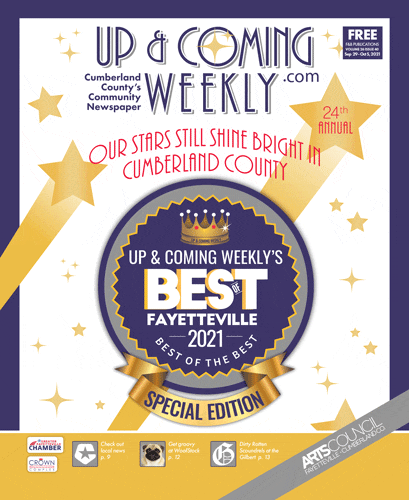 Wow! For over two decades, our community newspaper has provided residents, visitors and guests insights into the people, businesses and organizations that invest extra time and effort into making our community unique.
Wow! For over two decades, our community newspaper has provided residents, visitors and guests insights into the people, businesses and organizations that invest extra time and effort into making our community unique.
Our Best of Fayetteville survey is also unique. Our dedicated readers pride themselves on making sure they are the ones who define and determine who Fayetteville’s Best of the Best are. No nominations, no ballot stuffing. Only well-defined enforceable voting guidelines have elevated the honor and integrity of the Best of Fayetteville designation.
However, the survey is not scientific. It is an informal survey, and we make no claims otherwise. However, it has proven to be highly accurate.
Following a frustrating year of staying at home, social distancing, vaccine confusion, mask-wearing, and an overall lack of social interaction, we are slowly beginning to get our lives back to normalcy. So, now, let’s celebrate!
As our faithful readers know, Up & Coming Weekly’s biggest celebration of the year is recognizing and honoring our community’s outstanding people, businesses and institutions. This year we are celebrating the occasion at the Crown Coliseum, one of our newest Best of Fayetteville sponsors.
Here is where the Best of the Best will congregate to celebrate their achievements and contributions to our All-American City.
Over the past 25 years, our community and our newspaper have changed immensely. However, the Best of Fayetteville readers survey has not. It continues to reflect the best aspects of the Fayetteville community. Annually, we receive thousands of ballots and painstakingly record the comments and sentiments of our readers.
This process allows us to get to know who, what and why they value our community members. It is these people, businesses and organizations we want to showcase and introduce to Fayetteville, Fort Bragg and Cumberland County residents as they continue to work hard year after year to improve, impact and elevate our local quality of life.
The Up & Coming Weekly Best of Fayetteville edition you are holding in your hands will serve you well throughout the year. It is a valuable visitor’s guide, service directory and cultural and event resource.
Please share it with your friends. The format and guidelines for this sanctioned, time-tested survey have been designed and audited to provide residents, local businesses and organizations the recognition they deserve for their ethics, dedication and perseverance in their quest for excellence.
Since the first ballots were counted more than two decades ago, Up & Coming Weekly has successfully told the Best of Fayetteville winners’ stories. With your votes and support, we are extremely proud to share this year’s Best of the Best winners with you. Please join me and the entire Up & Coming Weekly staff and all our 2021 Best of Fayetteville sponsors as we begin this yearlong celebration.
For 24/7, 365-days-a-year access to the Best of Fayetteville winners, visit www.upandcomingweekly.com. While you’re there, sign up for our FREE electronic subscription and receive the Early Bird edition of Up & Coming Weekly every Tuesday
afternoon.
I want to thank Mac Healy of Healy Wholesale and Jim Grafstrom of the Crown Coliseum for their help and support. I also want to thank Jimmy Keefe of the Trophy House for creating the beautiful Best of Fayetteville plaques they designed and his service as a Cumberland County Commissioner. Of course, every legitimate survey needs a competent CPA, and we have the best. Lee Utley has supported and partnered with us for nearly two decades, and his services have been invaluable.
Again, we hope you enjoy this special edition of Up & Coming Weekly. Keep it handy and refer to it often.
We sincerely thank you for reading Up & Coming Weekly and supporting your only locally-owned community newspaper.